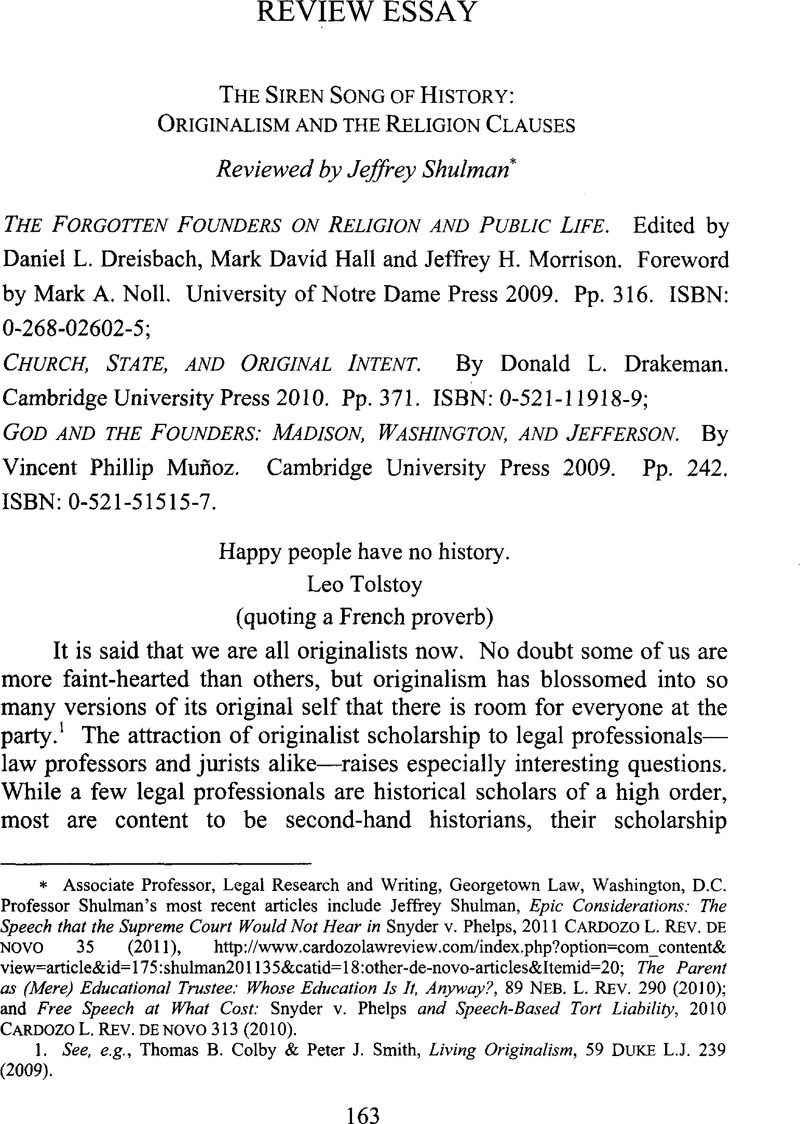No CrossRef data available.
Article contents
The Siren Song of History: Originalism and the Religion Clauses
Published online by Cambridge University Press: 24 April 2015
Abstract

- Type
- Review Essay
- Information
- Copyright
- Copyright © Center for the Study of Law and Religion at Emory University 2012
References
1. See, e.g., Colby, Thomas B. & Smith, Peter J., Living Originalism, 59 Duke L.J. 239 (2009)Google Scholar.
2. On the use and abuse of historical evidence in Establishment Clause controversy, see, e.g., Green, Steven K., “Bad History”: The Lure of History in Establishment Clause Adjudication, 81 Notre Dame L. Rev. 1717 (2006)Google Scholar; Gey, Steven G., More or Less Bunk: The Establishment Clause Answers That History Doesn't Provide, 2004 Byu L. Rev. 1617 (2004)Google Scholar. Cf., e.g., Eisgruber, Christopher L., The Living Hand of the Past: History and Constitutional Justice, 65 Fordham L. Rev. 1611, 1622 (1997)Google Scholar; and Dreisbach, Daniel L., Everson and the Command of History: The Supreme Court, Lessons of History, and Church-State Debate in America, in Everson Revisited: Religion, Education, and Law at the Crossroads 23–57 (Formicola, Jo Renée & Morken, Hubert eds., Rowman & Littlefield 1997)Google Scholar. See generally Farber, Daniel A. & Sherry, Suzanna, Desperately Seeking Certainty: The Misguided Quest for Constitutional Foundations (Univ. Chi. Press 2002)Google Scholar.
3. For another list of forgotten founders, see Novak, Michael, On Two Wings: Humble Faith and Common Sense at the American Founding 127-58 (Encounter Books 2002)Google Scholar.
4. Muñoz, Vincent, The Original Meaning of the Free Exercise Clause: The Evidence from the First Congress, 31 Harv. J.L. & Pub. Pol'y 1083 (2008)Google Scholar; Muñoz, Vincent, The Original Meaning of the Establishment Clause and the Impossibility of Its Incorporation, 8 Univ. Pa. J. Const. L. 585 (2006)Google Scholar.
5. See Braveman, Daan, The Establishment Clause and the Course of Religious Neutrality, 45 Md. L. Rev. 352, 375 (1986)Google Scholar (“[A] literal quest for the Framers' intent may be both futile and misdirected.”).
6. See generally Smith, Stephen D., Foreordained Failure: The Quest for a Constitutional Principle of Religious Freedom (Oxford Univ. Press 1995)Google Scholar.
7. See, e.g., Levy, Leonard W., Jefferson and Civil Liberties: The Darker Side (Belknap Press 1963)Google Scholar; Tyack, David, Forming the National Character: Paradox in the Educational Thought of the Revolutionary Generation, 36 Harv. Educ. Rev. 29 (1966)CrossRefGoogle Scholar.




